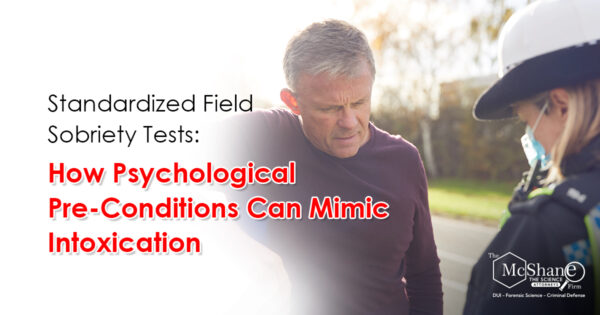Introduction
Standardized Field Sobriety Tests (SFSTs) are widely used by law enforcement to determine if a driver is impaired due to alcohol or drugs. These tests are designed to evaluate a person’s physical and cognitive abilities, which can be negatively affected by intoxication. However, SFSTs are not foolproof and may lead to false positives. One reason for this is that psychological pre-conditions, such as stress or anxiety disorders, can mimic the signs of intoxication. This blog post will explore the technical, specific, and scientific aspects of how psychological pre-conditions can impact SFST results.
The Three Standardized Field Sobriety Tests
The National Highway Traffic Safety Administration (NHTSA) has established three SFSTs that are commonly used by law enforcement officers:
- Horizontal Gaze Nystagmus (HGN) Test: This test evaluates the involuntary jerking of the eyes as they gaze side-to-side. Alcohol and certain drugs can exaggerate this jerking, making it more pronounced and easier to detect.
- Walk-and-Turn Test: This test assesses a person’s balance, coordination, and ability to follow instructions. The subject is asked to walk heel-to-toe along a straight line, turn around, and walk back in the same manner.
- One-Leg Stand Test: The subject is instructed to stand on one foot and hold the other foot about six inches off the ground while counting out loud until told to stop. This test also evaluates balance and coordination.
How Psychological Pre-Conditions Can Mimic Intoxication
Stress and anxiety disorders can have a significant impact on an individual’s cognitive and physical abilities. These psychological pre-conditions can cause symptoms that closely resemble the signs of intoxication, leading to false-positive results on SFSTs.
- Impact on the HGN Test: Stress and anxiety can cause increased eye movement, making it difficult for an officer to accurately assess nystagmus. This can result in a false-positive result, as the officer may attribute the increased eye movement to intoxication rather than an anxiety disorder.
- Impact on the Walk-and-Turn Test: Anxiety can cause muscle tension, trembling, and poor concentration. These symptoms can affect a person’s balance and coordination, making it difficult to perform the walk-and-turn test accurately. Additionally, a person experiencing stress or anxiety may struggle to follow the test’s instructions, leading the officer to believe that they are intoxicated.
- Impact on the One-Leg Stand Test: Similar to the walk-and-turn test, anxiety can cause trembling and poor balance, making it difficult to perform the one-leg stand test accurately. A person experiencing stress or anxiety may also struggle to count out loud, as their focus may be on their internal thoughts and emotions rather than the task at hand.
Conclusion
Standardized Field Sobriety Tests are an important tool for law enforcement officers in detecting impaired drivers. However, it is essential to recognize that psychological pre-conditions, such as stress and anxiety disorders, can mimic the signs of intoxication and lead to false-positive results. If you or a loved one has been charged with a DUI and believe that a psychological pre-condition may have impacted the SFST results, it is crucial to consult with an experienced DUI attorney. The McShane Firm has a team of skilled attorneys who understand the technical and scientific aspects of SFSTs and can help you build a strong defense. Contact us today for a consultation.
